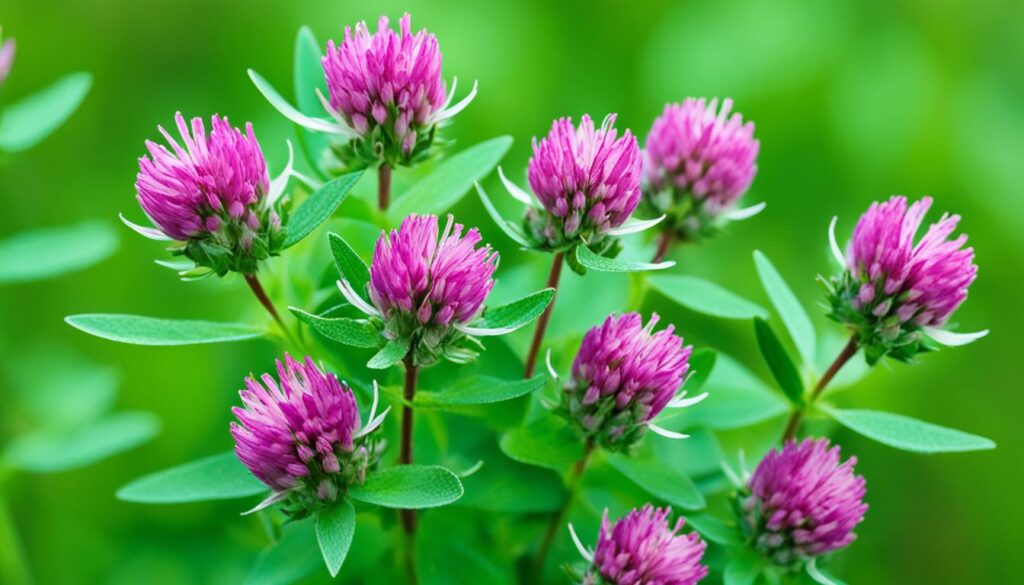Did you know that red clover, a popular component of herbal remedies for women’s health, contains phytoestrogens that provide relief from menopause symptoms and support hormonal balance in women?
Red clover has long been used as a natural estrogen replacement, offering various benefits for female reproductive health. From alleviating PMS symptoms to promoting fertility and breast health, this flowering plant holds potential for enhancing overall sexual health and wellness.
Key Takeaways:
- Red clover is a flowering plant commonly used in herbal remedies for women’s health.
- It contains phytoestrogens that mimic estrogen and help with hormonal balance in women.
- Red clover may provide relief from menopause symptoms, such as hot flashes and night sweats.
- It offers potential benefits for bone health, fertility, PMS symptom relief, and breast health.
- However, more scientific research is needed to fully understand the effectiveness of red clover and its interactions with medications.
What is Red Clover?
Red clover, scientifically known as Trifolium pratense, is a dark-pink herbaceous plant commonly used in traditional medicine. It is native to Europe, Asia, and North Africa and has now spread to South America as a fodder crop.
Red clover is traditionally used to treat a range of health conditions, including osteoporosis, heart disease, skin disorders, cancer, respiratory problems, menstrual symptoms, and menopausal symptoms. However, the scientific evidence supporting these uses is limited.
| Uses of Red Clover in Traditional Medicine | Evidence |
|---|---|
| Osteoporosis | Limited |
| Heart Disease | Insufficient |
| Skin Disorders | Preliminary |
| Cancer | Preclinical |
| Respiratory Problems | Preliminary |
| Menstrual Symptoms | Insufficient |
| Menopausal Symptoms | Limited |
Potential Benefits of Red Clover
While scientific evidence is limited, red clover is believed to have several potential benefits. It may help improve bone health by reducing the risk of osteoporosis.
The isoflavones in red clover, which are plant compounds that mimic estrogen, are thought to alleviate menopausal symptoms such as hot flashes, night sweats, anxiety, depression, and vaginal dryness. Red clover extract has also shown promise in improving skin health and hair health, as well as supporting heart health.
However, more research is needed to confirm these benefits. It is important to note that individual results may vary, and red clover should be used as part of a comprehensive approach to overall health and wellness.
To promote bone health, red clover can be considered as part of a well-rounded lifestyle that includes a nutritious diet, regular exercise, and appropriate supplementation. Always consult with a healthcare professional before incorporating new dietary supplements into your routine.
To give you a better understanding of these potential benefits, here is a table summarizing the possible advantages of red clover:
| Potential Benefits of Red Clover |
|---|
| Improved bone health and reduced risk of osteoporosis |
| Alleviation of menopausal symptoms such as hot flashes, night sweats, anxiety, depression, and vaginal dryness |
| Promotion of skin and hair health |
| Support for heart health |
While these benefits are often associated with red clover, it’s crucial to note that individual experiences may vary. Furthermore, long-term clinical studies are needed to validate the extent of these advantages.

Downsides and Side Effects of Red Clover
Red clover is generally considered safe, but it’s essential to be aware of its potential downsides and side effects. While many individuals may experience no adverse reactions, some rare cases have reported the following:
- Vaginal Spotting: Some women may experience spotting or irregular bleeding while using red clover.
- Prolonged Menstruation: Red clover might cause extended periods in some women.
- Skin Irritation: Skin irritation or rashes may occur due to the topical use of red clover.
- Nausea and Headache: In rare cases, red clover usage may lead to nausea or headache.
- Subarachnoid Hemorrhage: Although extremely uncommon, a few severe cases of subarachnoid hemorrhage have been reported; however, a conclusive link to red clover couldn’t be established.
- Stomach Pain: Some individuals may experience stomach pain or digestive discomfort after taking red clover.
- Drug Interactions: Red clover may interact with certain medications, particularly those used for hormone-sensitive conditions like breast cancer. It is crucial to consult a healthcare professional before consuming red clover supplements.
It’s important to note that individual reactions may vary, and it’s always advisable to seek medical advice before using red clover, especially if you have any pre-existing conditions or are taking medications.
Now that you are aware of the potential downsides and side effects of red clover, let’s explore its uses and dosage in the next section.
Uses and Dosage of Red Clover
Red clover is a versatile herb that can be consumed in various forms, including supplements, tea, tinctures, and extracts. Each form has its benefits and uses, depending on the desired outcome and individual preference.
When it comes to supplements, the recommended dosage of red clover typically ranges from 40-80 mg based on clinical research and safety data. It’s important to follow the manufacturer’s instructions and consult with a healthcare professional before starting any new supplement regimen.
Red clover tea, on the other hand, is a popular choice for those who prefer a traditional herbal remedy. To make red clover tea, steep 4 grams of dried flower tops in 1 cup of boiling water for 5-10 minutes.
This method allows the healthful properties of red clover to be infused into the water. However, it’s essential to note that the potential health effects of red clover tea may not be as potent as concentrated forms like supplements and extracts.
For those seeking a more concentrated dose, red clover tinctures and extracts are available. These forms typically provide a higher concentration of the beneficial compounds found in red clover, making them more potent.
Again, it’s crucial to follow the recommended dosage provided by the manufacturer and seek guidance from a healthcare professional if needed.
Osteoporosis and Bone Health
One of the primary uses of red clover is in the management of osteoporosis and the promotion of bone health. Red clover is rich in isoflavones, which are plant compounds that have been linked to improved bone density and reduced risk of bone loss.
While more research is needed, early studies suggest that red clover may be beneficial for individuals concerned about bone health, particularly women approaching menopause.
Menopausal Symptoms
Red clover is commonly used as a natural remedy to alleviate menopausal symptoms, such as hot flashes, night sweats, and mood swings. The isoflavones present in red clover act similarly to estrogen in the body, which helps regulate hormonal imbalances that occur during menopause.
While the evidence is still limited, red clover shows promise in providing relief from common menopausal discomforts.
Respiratory Conditions
Red clover has a long history of use in traditional medicine for respiratory conditions like coughs, bronchitis, and asthma. It is believed to have expectorant properties, helping to loosen phlegm and promote easier breathing.
However, more scientific research is needed to fully understand its effectiveness and recommended dosage for respiratory conditions.
Skin Conditions
Red clover is also believed to have benefits for the skin, including its potential to improve certain skin conditions. Some studies suggest that red clover’s isoflavones may help reduce skin inflammation and improve overall skin health. However, more research is needed to determine the specific dosage and effectiveness for different skin conditions.
Cardiovascular Health
Another potential use of red clover is in supporting cardiovascular health. Preliminary studies indicate that red clover may help improve blood flow, reduce cholesterol levels, and maintain the health of blood vessels.
It’s important to note that while red clover shows promise for various uses, the scientific evidence is still limited, and more research is needed to confirm its effectiveness and recommended dosages for specific conditions.
Consultation with a healthcare professional is recommended before beginning any new herbal supplement regimen, especially if you have any underlying health conditions or are taking other medications.

Red Clover Dosage Recommendations
| Form | Dosage | Potency |
|---|---|---|
| Supplement | 40-80 mg | Varies based on individual formulations |
| Tea | 4 grams of dried flower tops steeped in 1 cup of boiling water for 5-10 minutes | Milder potency compared to supplements and extracts |
| Tincture | Follow manufacturer’s instructions | Higher concentration compared to tea |
| Extract | Follow manufacturer’s instructions | High concentration for maximum potency |
Folklore and History of Red Clover
Red clover has a rich history and is highly regarded in various cultures. It has been used as a blood purifier in traditional herbal medicine and is considered beneficial for women’s health, particularly for menstrual and menopausal symptoms.
In Traditional Chinese Medicine, red clover has been used as a diuretic, expectorant, and to treat chronic conditions. The ancient Greeks and Romans associated red clover with their goddesses, believing it to possess powerful healing properties. The Ancient Celts considered red clover a symbol of the sun and used it in rituals and celebrations.
Red clover has also been utilized in traditional medicine to treat various skin conditions, such as eczema and psoriasis, due to its potential anti-inflammatory properties. The flowers were often used to make poultices and ointments to soothe skin irritations.
Overall, the folklore and history of red clover highlight its long-established role as a natural remedy for diverse health concerns and cultural symbolism. While scientific research is limited, red clover’s historical uses and traditional significance continue to contribute to its reputation as a versatile plant in promoting overall well-being.
Conclusion
Red clover, a traditional herbal remedy for women’s health conditions and menopause symptoms, shows potential benefits in promoting bone health, relieving menopausal symptoms, improving skin and hair health, and supporting heart health. However, the scientific research on red clover is limited, and more studies are needed to confirm its effectiveness.
While red clover has been used for centuries, caution should be exercised when using it, as it can interact with certain medications and may have side effects. It is advisable to consult a healthcare professional before incorporating red clover into your wellness routine.
In conclusion, red clover can be part of a holistic approach to female sexual health and wellness. As an herbal remedy, it may provide some relief for women experiencing hormonal imbalances, menopausal symptoms, and other female reproductive health concerns.
However, further research is necessary to fully understand the extent of its benefits and potential risks associated with its use. Stay informed and consult with a healthcare provider to make the best decisions for your health.
FAQ
What are the potential benefits of red clover for female sexual health and wellness?
Red clover is believed to have potential benefits in promoting bone health, reducing menopausal symptoms, improving skin and hair health, and supporting heart health. However, scientific evidence is limited, and more research is needed to confirm these claims.
What is red clover and how is it used in traditional medicine?
Red clover, scientifically known as Trifolium pratense, is a dark-pink herbaceous plant commonly used in traditional medicine.
It is traditionally used to treat a range of health conditions, including osteoporosis, heart disease, skin disorders, cancer, respiratory problems, menstrual symptoms, and menopausal symptoms. However, the scientific evidence supporting these uses is limited.
How can red clover potentially benefit women’s health?
Red clover may help improve bone health by reducing the risk of osteoporosis. The plant compounds in red clover, called isoflavones, mimic estrogen and are believed to alleviate menopausal symptoms such as hot flashes, night sweats, anxiety, depression, and vaginal dryness.
Red clover extract has also shown promise in improving skin and hair health and supporting heart health. However, more research is needed to confirm these benefits.
What are the potential downsides and side effects of using red clover?
Some potential downsides and side effects of red clover include vaginal spotting, prolonged menstruation, skin irritation, nausea, and headache. Rare but serious side effects like subarachnoid hemorrhage and stomach pain have been reported, although these cases couldn’t be directly linked to red clover.
Red clover may also interact with certain medications, especially those used for hormone-sensitive conditions like breast cancer.
How is red clover used and what is the recommended dosage?
Red clover is commonly available as a supplement, tea, tincture, or extract. The recommended dosage for red clover supplements is usually 40-80 mg based on clinical research and safety data. Red clover tea can be made by steeping 4 grams of dried flower tops in 1 cup of boiling water for 5-10 minutes.
However, it’s important to note that the health effects of red clover tea may not be as potent as concentrated forms like supplements and extracts. It’s important to follow the recommended dosage and consult a healthcare professional for specific guidance.
What is the folklore and history of red clover?
Red clover has a rich history and is highly regarded in various cultures. It has been used as a blood purifier in traditional herbal medicine and is considered beneficial for women’s health, particularly for menstrual and menopausal symptoms.
In Traditional Chinese Medicine, it has been used as a diuretic, expectorant, and to treat chronic conditions. The ancient Greeks and Romans associated red clover with their goddesses, and the Ancient Celts considered it a symbol of the sun. Red clover has also been used to treat skin conditions in traditional medicine.




